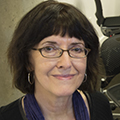Personal Mention
 Carnegie Mellon has named Materials Science and Engineering and Engineering and Public Policy Professor Jay F. Whitacre the new director of the Wilton E. Scott Institute for Energy Innovation, effective May 1. Whitacre has been a standout innovator in the world of energy technologies. He came to Carnegie Mellon in 2007, and quickly made a name for himself in the field of low-cost stationary energy storage, developing a novel battery chemistry and design that uses only non-toxic, non-flammable chemicals. This unique battery became the basis for Aquion Energy, an energy storage technology company founded by Whitacre in 2009. As an institutional leader, he has served on the boards of multiple energy technology companies, as well as on committees for the National Academies of Sciences, Engineering and Medicine. In 2015, Whitacre received the prestigious Lemelson-MIT Prize for inventing the first mass-produced, low-cost and eco-friendly battery. Read more.
Carnegie Mellon has named Materials Science and Engineering and Engineering and Public Policy Professor Jay F. Whitacre the new director of the Wilton E. Scott Institute for Energy Innovation, effective May 1. Whitacre has been a standout innovator in the world of energy technologies. He came to Carnegie Mellon in 2007, and quickly made a name for himself in the field of low-cost stationary energy storage, developing a novel battery chemistry and design that uses only non-toxic, non-flammable chemicals. This unique battery became the basis for Aquion Energy, an energy storage technology company founded by Whitacre in 2009. As an institutional leader, he has served on the boards of multiple energy technology companies, as well as on committees for the National Academies of Sciences, Engineering and Medicine. In 2015, Whitacre received the prestigious Lemelson-MIT Prize for inventing the first mass-produced, low-cost and eco-friendly battery. Read more.

 Many policies — from medicine to terrorism — depend on how the general public accepts and understands scientific evidence. People view different branches of sciences as having different amounts of uncertainty, which may not reflect the actual uncertainty of the field. Stephen Broomell, assistant professor of social and decision sciences, and Ph.D. student Patrick Bodilly Kane took the first step to understanding more of the whole picture by measuring scientific uncertainty broadly — across many areas of science, not just topics that are typically polarized. Learn more.
Many policies — from medicine to terrorism — depend on how the general public accepts and understands scientific evidence. People view different branches of sciences as having different amounts of uncertainty, which may not reflect the actual uncertainty of the field. Stephen Broomell, assistant professor of social and decision sciences, and Ph.D. student Patrick Bodilly Kane took the first step to understanding more of the whole picture by measuring scientific uncertainty broadly — across many areas of science, not just topics that are typically polarized. Learn more.  Nichole Argo, a research scientist in the Department of Engineering and Public Policy with a courtesy appointment in the Department of Social and Decision Sciences, teamed up with The New School for Social Research’s Nadine Obeid and Jeremy Ginges to better understand group tolerance. Their study of groups in tension or conflict found evidence that people are willing to share a society with those of differing beliefs as long as they believe that those groups share a commitment to universal moral values such as fairness and harm. The findings undermine political claims that conflicts arise because of differences in what they call “binding” values, such as beliefs about God, purity or deference to authority. Members of groups may believe in these things, but they don't necessarily expect others to share those beliefs. Learn more.
Nichole Argo, a research scientist in the Department of Engineering and Public Policy with a courtesy appointment in the Department of Social and Decision Sciences, teamed up with The New School for Social Research’s Nadine Obeid and Jeremy Ginges to better understand group tolerance. Their study of groups in tension or conflict found evidence that people are willing to share a society with those of differing beliefs as long as they believe that those groups share a commitment to universal moral values such as fairness and harm. The findings undermine political claims that conflicts arise because of differences in what they call “binding” values, such as beliefs about God, purity or deference to authority. Members of groups may believe in these things, but they don't necessarily expect others to share those beliefs. Learn more.
 The Computing Research Association has selected the School of Computer Science’s Carol Frieze as the recipient of its 2017 A. Nico Habermann Award, recognizing her sustained, successful efforts to promote diversity in computer science. Frieze directs both Women@SCS, a student/faculty organization that promotes opportunities for women, and SCS4ALL, a student-run initiative to broaden participation in computing by underrepresented groups. Her work has helped SCS consistently enroll and graduate a higher percentage of women than the national average. Last fall, almost half of SCS’s first-year students were women, a record. Read more.
The Computing Research Association has selected the School of Computer Science’s Carol Frieze as the recipient of its 2017 A. Nico Habermann Award, recognizing her sustained, successful efforts to promote diversity in computer science. Frieze directs both Women@SCS, a student/faculty organization that promotes opportunities for women, and SCS4ALL, a student-run initiative to broaden participation in computing by underrepresented groups. Her work has helped SCS consistently enroll and graduate a higher percentage of women than the national average. Last fall, almost half of SCS’s first-year students were women, a record. Read more.
 Ran Zhao, a Ph.D. student in the Language Technologies Institute, has been named Carnegie Mellon's first Alexa Fund fellow. The Alexa Fund Fellowship is a new program from Amazon that supports universities and researchers focused on transformative voice technologies such as text-to-speech, natural language understanding, automatic speech recognition and conversational artificial intelligence. Amazon named the fellowship program for Alexa, its voice service that powers devices such as Amazon Echo. Zhao, who hopes to complete his Ph.D. in language and information technology next year, earned a bachelor's degree in computer science at the University of Illinois, Urbana-Champaign, and a master's degree at Yale University. CMU is one of the first four universities to be chosen to be part of the Alexa Fund Fellowship. Read more.
Ran Zhao, a Ph.D. student in the Language Technologies Institute, has been named Carnegie Mellon's first Alexa Fund fellow. The Alexa Fund Fellowship is a new program from Amazon that supports universities and researchers focused on transformative voice technologies such as text-to-speech, natural language understanding, automatic speech recognition and conversational artificial intelligence. Amazon named the fellowship program for Alexa, its voice service that powers devices such as Amazon Echo. Zhao, who hopes to complete his Ph.D. in language and information technology next year, earned a bachelor's degree in computer science at the University of Illinois, Urbana-Champaign, and a master's degree at Yale University. CMU is one of the first four universities to be chosen to be part of the Alexa Fund Fellowship. Read more.
